TAFSIR YA-SEEN By Dr. Abu Ameenah Bilal Philips
TAFSIR YA-SEEN By Dr. Abu Ameenah Bilal Philips
Publisher:
Dakwah Corner Publisher
Author:
Dr. Abu Ameenah Bilal Philips
Language:
English
,
Arabic
Binding:
Hard Cover
Pages: 361
Size: A4|8.3x11.7in | 21 x 29.7 cm
Couldn't load pickup availability

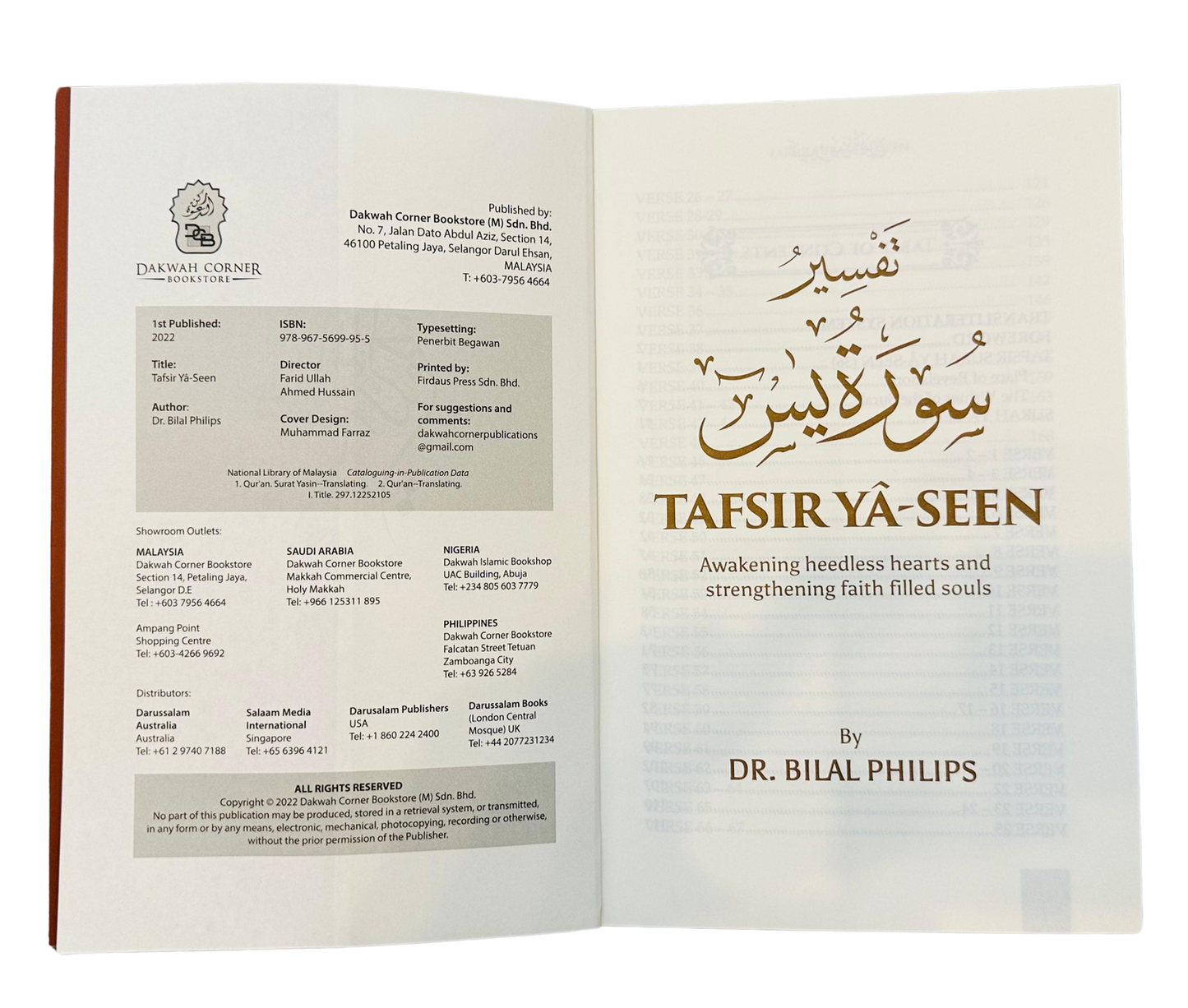
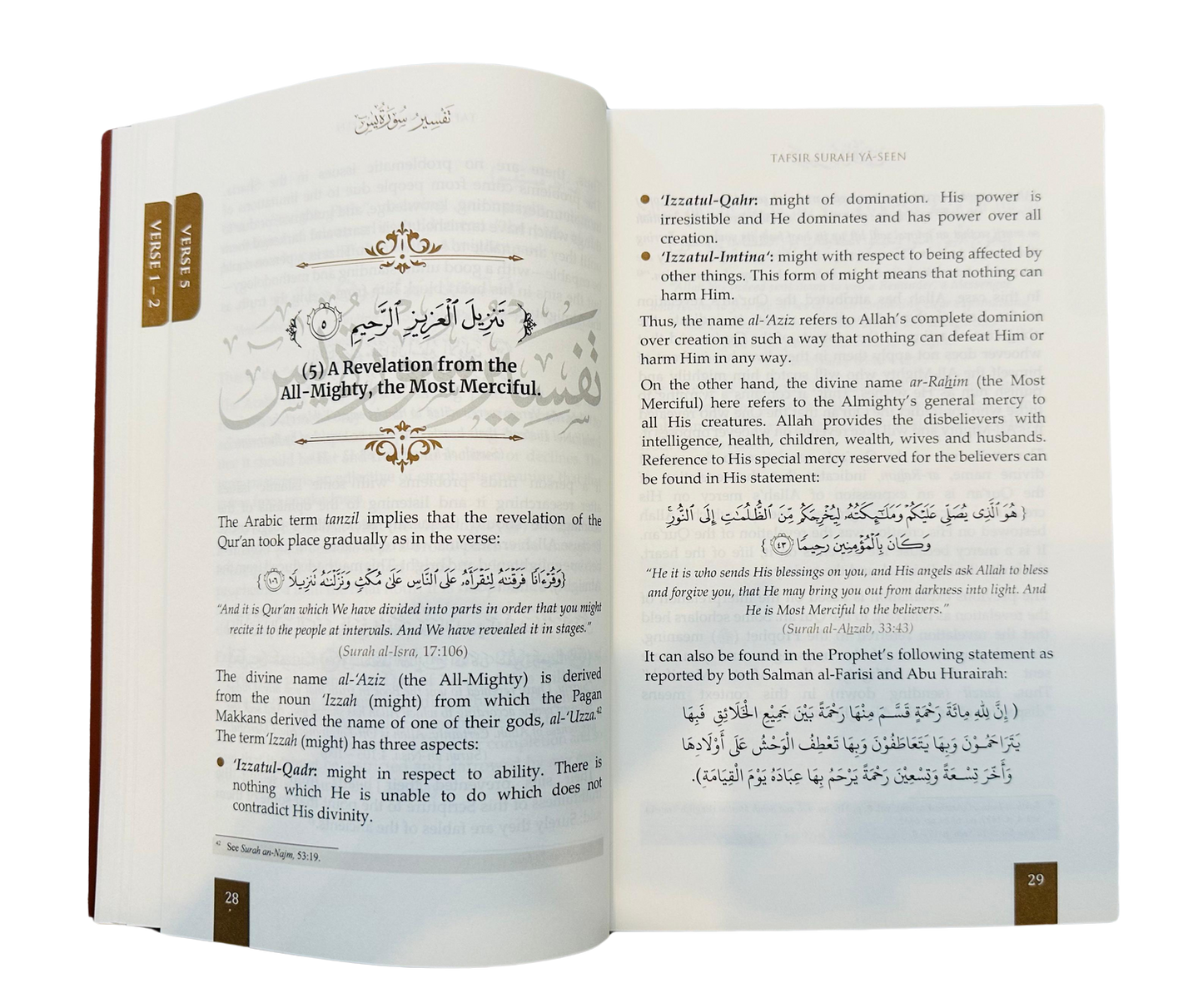
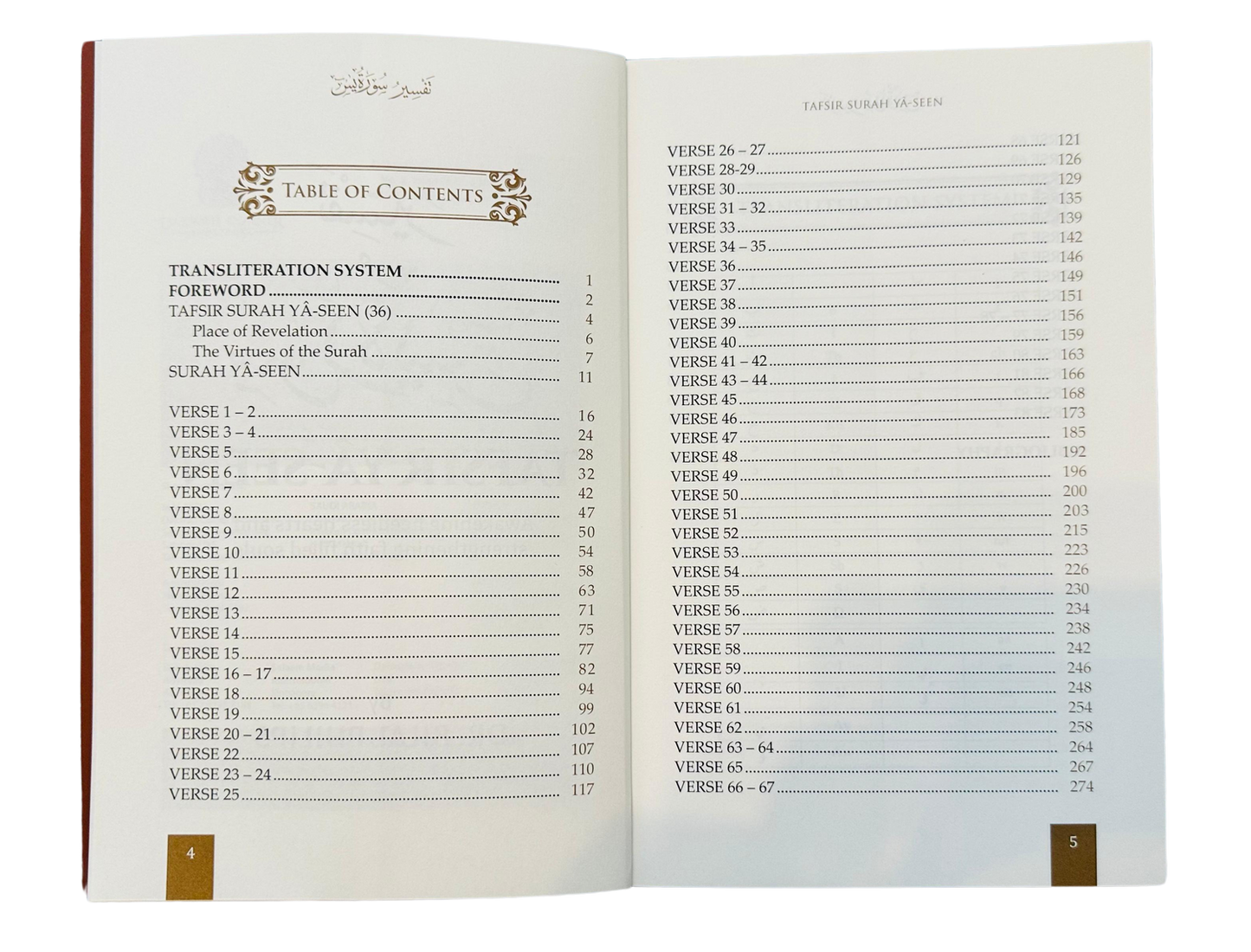
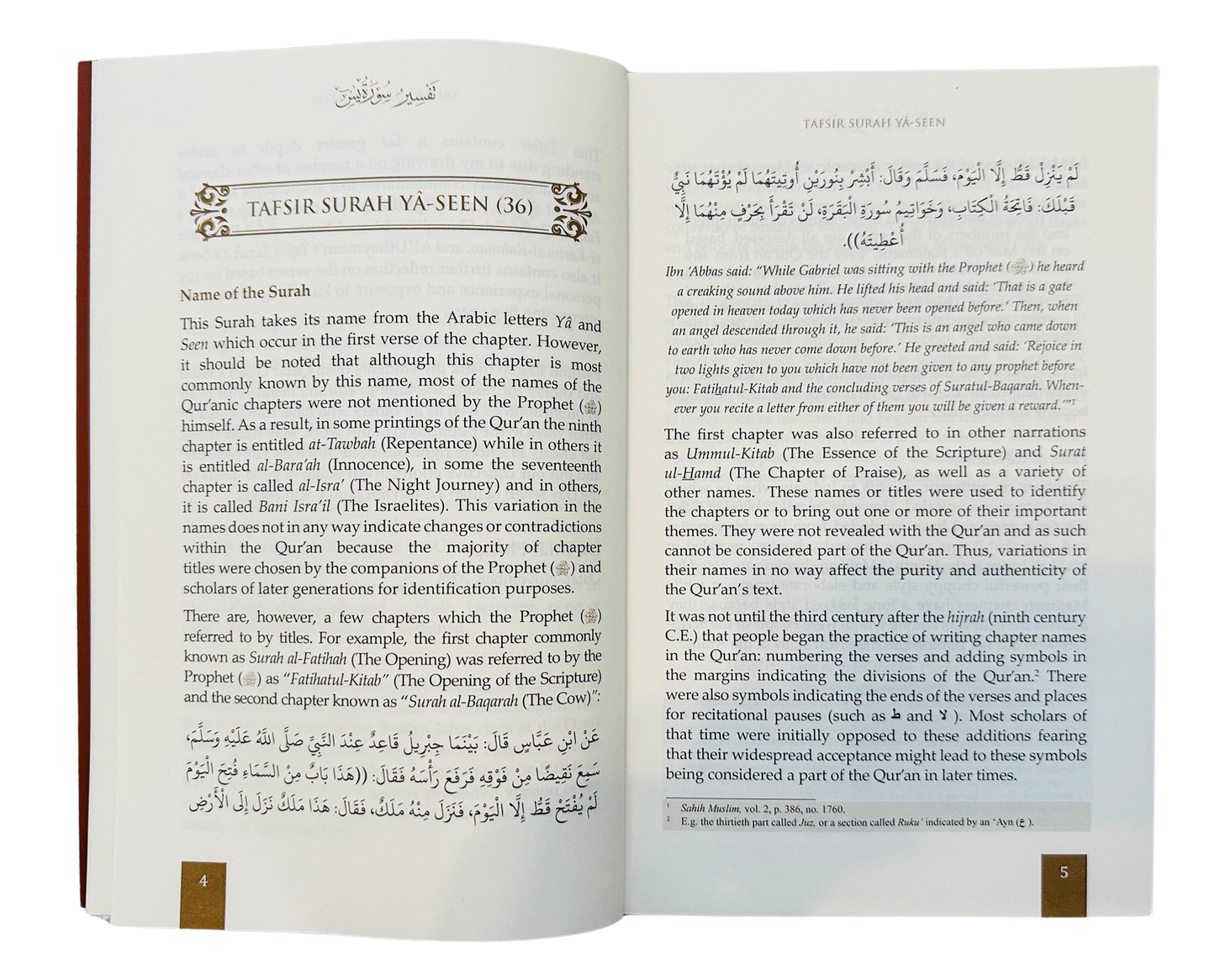
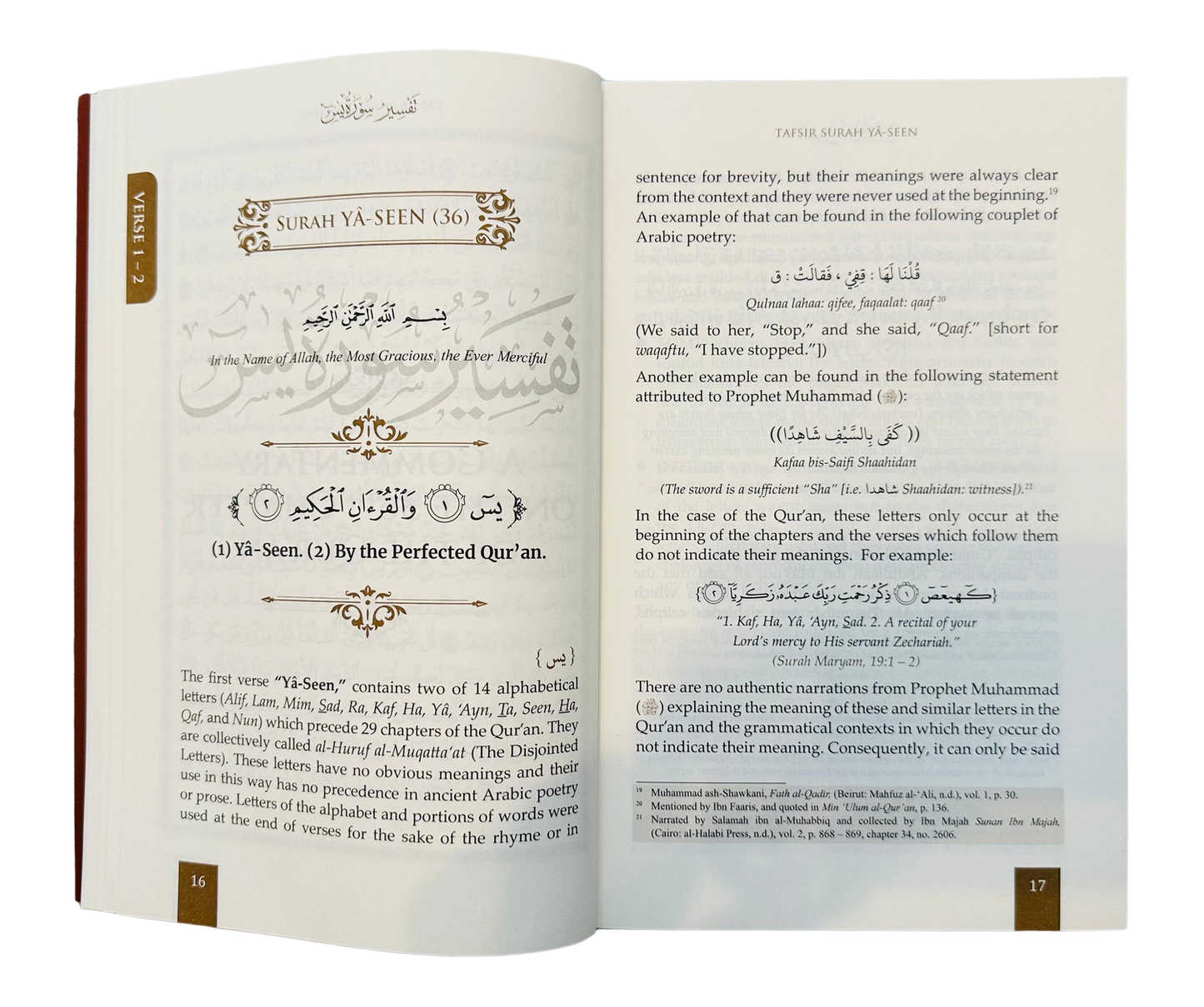
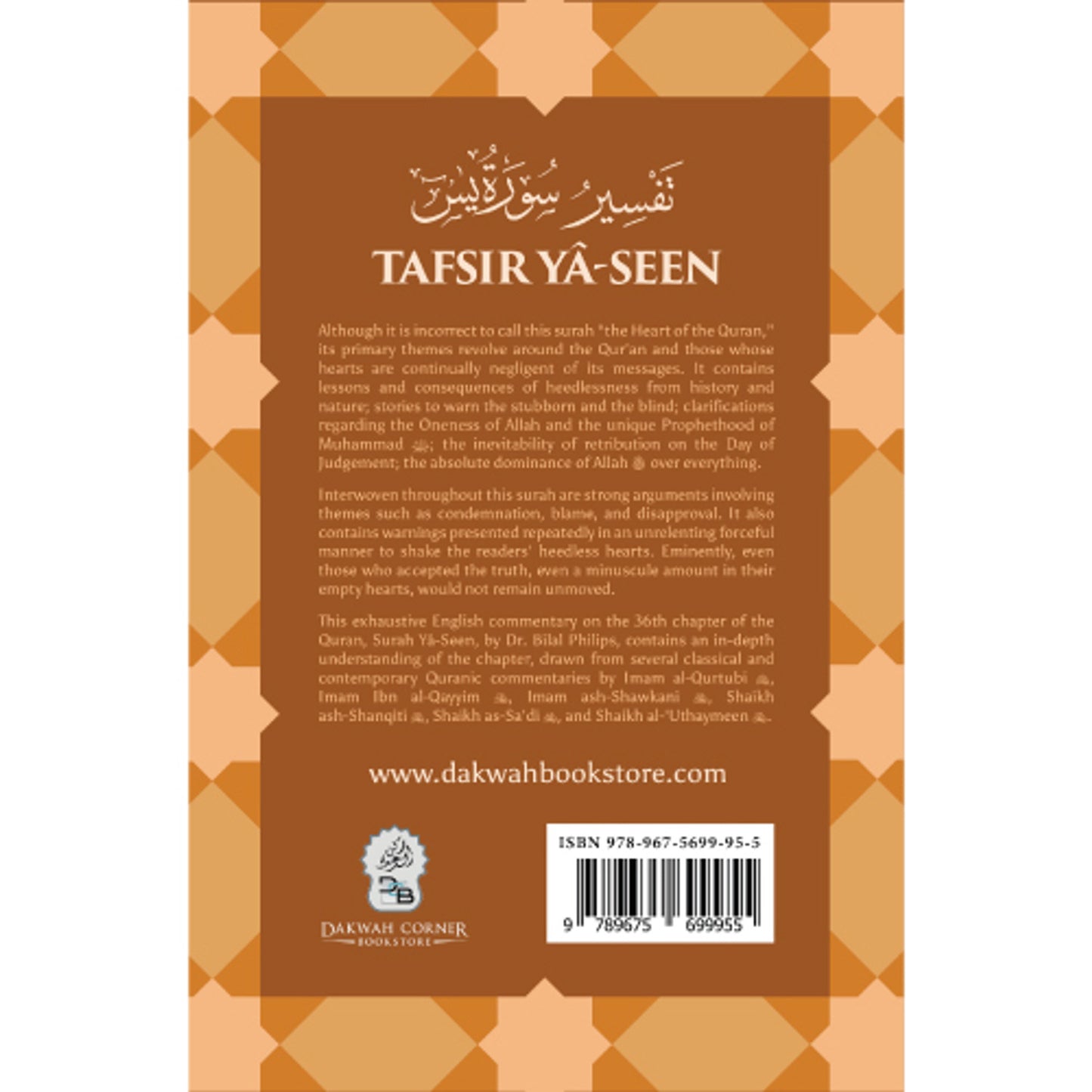
Collapsible content
Description of Book
TAFSIR YA-SEEN By Dr. Abu Ameenah Bilal Philips
TAFSIR YA-SEEN by Dr. Abu Ameenah Bilal Philips is an insightful and detailed commentary on Surah Ya-Seen, one of the most significant chapters of the Quran. This book explores the deep meanings and wisdom behind the verses of Surah Ya-Seen, offering readers a thorough understanding of its spiritual, moral, and practical teachings. Dr. Bilal Philips draws on classical and contemporary interpretations to provide a clear and accessible explanation, making it relevant for both new learners and those seeking a deeper understanding of the Quranic message.
The commentary delves into key themes such as the importance of belief in the Oneness of Allah, the role of the Prophet Muhammad (PBUH), the challenges faced by earlier communities, and the promise of eternal life. It also reflects on the Surah's powerful impact in fostering faith and inspiring righteous action.
Through TAFSIR YA-SEEN, Dr. Bilal Philips offers valuable insights on how to incorporate the lessons of this Surah into daily life, helping readers strengthen their connection with Allah and live in accordance with His guidance. Whether for personal reflection or group study, this book serves as an essential resource for anyone looking to deepen their understanding of Surah Ya-Seen and its relevance in modern times.
Publisher
Dakwah Corner Publisher
Author
- Dr. Abu Ameenah Bilal Philips
Sample Pages - Content
Page : 01
نَفْسِيرُ سورة ليس TAFSIR YA-SEEN Awakening heedless hearts and strengthening faith filled souls By DR. BILAL PHILIPS
Page : 02
DAKWAH CORNER BOOKSTORE- Published by: Dakwah Corner Bookstore (M) Sdn. Bhd. No. 7, Jalan Dato Abdul Aziz, Section 14, 46100 Petaling Jaya, Selangor Darul Ehsan, MALAYSIA T: +603-7956 4664 VERSE 26-27 VERSE 28-29 VERSE 309 VERSE 350 2T Printed by: 1st Published: 2022 ISBN: 978-967-5699-95-5 Typesetting: Penerbit Begawan Title: Tafsir Yâ-Seen Director Farid Ullah Ahmed Hussain Author: Dr. Bilal Philips Cover Design: Muhammad Farraz Showroom Outlets: MALAYSIA Firdaus Press Sdn. Bhd. For suggestions and comments: dakwahcornerpublications @gmail.com National Library of Malaysia Cataloguing-in-Publication Data 1. Qur'an. Surat Yasin--Translating. 2. Qur'an-Translating. Dakwah Corner Bookstore Section 14, Petaling Jaya, Selangor D.E Tel: +603 7956 4664 Ampang Point Shopping Centre Tel: +603-4266 9692 Distributors: Darussalam Australia Australia I. Title. 297.12252105 SAUDI ARABIA Dakwah Corner Bookstore Makkah Commercial Centre, Holy Makkah Tel: +966 125311 895 Salaam Media NIGERIA Dakwah Islamic Bookshop UAC Building, Abuja Tel: +234 805 603 7779 PHILIPPINES Dakwah Corner Bookstore Falcatan Street Tetuan Zamboanga City Tel: +63 926 5284 Darusalam Publishers USA Darussalam Books (London Central Mosque) UK International Singapore Tel: +1 860 224 2400 Tel: +61 2 9740 7188 Tel: +65 6396 4121 Tel: +44 2077231234 VERSE 96 VERSE VERSE نَفْسِيرُ لاله سُورة ليس TAFSIR YA-SEEN Awakening heedless hearts and strengthening faith filled souls еям ALL RIGHTS RESERVED Copyright 2022 Dakwah Corner Bookstore (M) Sdn. Bhd. No part of this publication may be produced, stored in a retrieval system, or transmitted, in any form or by any means, electronic, mechanical, photocopying, recording or otherwise, without the prior permission of the Publisher. By 62 DR. BILAL PHILIPS
Page : 03
نَفْسِيرُ سُورا لين TAFSIR SURAH YA-SEEN 121 VERSE 26-27 126 VERSE 28-29. TABLE OF CONTENTS 129 VERSE 30. 135 VERSE 31-32 VERSE 33. VERSE 34-35. 139 142 TRANSLITERATION SYSTEM VERSE 36 146 149 FOREWORD VERSE 37 TAFSIR SURAH YA-SEEN (36) 2 151 VERSE 38 4 Place of Revelation VERSE 39 156 6 The Virtues of the Surah VERSE 40 159 7 SURAH YA-SEEN. VERSE 1-2 VERSE 3-4 VERSE 41 42. 163 11 VERSE 43-44. 166 VERSE 45 168 16 VERSE 46 173 24 VERSE 47 185 VERSE 5. 28 VERSE 48 192 VERSE 6. 32 VERSE 49 196 VERSE 7 42 VERSE 50 200 VERSE 8 47 VERSE 51 203 VERSE 9 50 VERSE 52 215 VERSE 10. 54 VERSE 53 223 VERSE 11 58 VERSE 54 226 VERSE 12 63 VERSE 55 230 VERSE 13. 71 VERSE 56.. 234 VERSE 14.. 75 VERSE 57 238 VERSE 15 77 VERSE 58 242 VERSE 16-17. 82 VERSE 59. 246 VERSE 18. 94 VERSE 60. 248 VERSE 19 99 VERSE 61. 254 VERSE 20-21 102 VERSE 62. 258 VERSE 22 107 VERSE 63-64. 264 VERSE 23-24. 110 VERSE 65. 267 VERSE 25 117 VERSE 66-67. 274 5
Page : 04
VERSE 5 VERSE 1-2 نَفْسِيرُ سُوار الين تَنزِيلَ الْعَزِيزِ الرَّحِيمِ (5) A Revelation from the All-Mighty, the Most Merciful. The Arabic term tanzil implies that the revelation of the Qur'an took place gradually as in the verse: {وَقُرْءَ أَنَا فَرَقْتَهُ لِنَقْرَأَهُ عَلَى النَّاسِ عَلَى مُكْثٍ وَنَزَلْتَهُ تَنزِيلًا ) "And it is Qur'an which We have divided into parts in order that you might recite it to the people at intervals. And We have revealed it in stages." (Surah al-Isra, 17:106) The divine name al-'Aziz (the All-Mighty) is derived from the noun 'Izzah (might) from which the Pagan Makkans derived the name of one of their gods, al-'Uzza. The term Izzah (might) has three aspects: 'Izzatul-Qadr: might in respect to ability. There is nothing which He is unable to do which does not contradict His divinity. See Surah an-Najm, 53:19. TAFSIR SURAH YA-SEEN ⚫ 'Izzatul-Qahr: might of domination. His power is irresistible and He dominates and has power over all creation. ⚫ 'Izzatul-Imtina': might with respect to being affected by other things. This form of might means that nothing can harm Him. Thus, the name al-'Aziz refers to Allah's complete dominion over creation in such a way that nothing can defeat Him or harm Him in any way. On the other hand, the divine name ar-Rahim (the Most Merciful) here refers to the Almighty's general mercy to all His creatures. Allah provides the disbelievers with intelligence, health, children, wealth, wives and husbands. Reference to His special mercy reserved for the believers can be found in His statement: هُوَ الَّذِى يُصَلِّي عَلَيْكُمْ وَمَلَتيكتُهُ لِيُخْرِجَكُم مِّنَ الظُّلُمَاتِ إِلَى النُّور وَكَانَ بِالْمُؤْمِنِينَ رَحِيمًا } dised on to "He it is who sends His blessings on you, and His angels ask Allah to bless and forgive you, that He may bring you out from darkness into light. And He is Most Merciful to the believers." (Surah al-Ahzab, 33:43) It can also be found in the Prophet's following statement as reported by both Salman al-Farisi and Abu Hurairah: ( إِنَّ لِلَّهِ مِائَةَ رَحْمَةٍ قَدَّمَ مِنْهَا رَحْمَةً بَيْنَ جَمِيعِ الْخَلَائِقِ فَبِهَا يَتَرَاحَمُوْنَ وَبِهَا يَتَعَاطَفُوْنَ وَبِهَا تَعْطِفُ الْوَحْشُ عَلَى أَوْلَادِهَا وَأَخَرَ تِسْعَةً وَتِسْعِيْنَ رَحْمَةً يَرْحَمُ بِهَا عِبَادَهُ يَوْمَ الْقِيَامَةِ). 28 29
Page : 05
VERSE 5 VERSE 1-2 نَفْسِيرُ سُوار الين تَنزِيلَ الْعَزِيزِ الرَّحِيمِ (5) A Revelation from the All-Mighty, the Most Merciful. The Arabic term tanzil implies that the revelation of the Qur'an took place gradually as in the verse: {وَقُرْءَ أَنَا فَرَقْتَهُ لِنَقْرَأَهُ عَلَى النَّاسِ عَلَى مُكْثٍ وَنَزَلْتَهُ تَنزِيلًا ) "And it is Qur'an which We have divided into parts in order that you might recite it to the people at intervals. And We have revealed it in stages." (Surah al-Isra, 17:106) The divine name al-'Aziz (the All-Mighty) is derived from the noun 'Izzah (might) from which the Pagan Makkans derived the name of one of their gods, al-'Uzza. The term Izzah (might) has three aspects: 'Izzatul-Qadr: might in respect to ability. There is nothing which He is unable to do which does not contradict His divinity. See Surah an-Najm, 53:19. TAFSIR SURAH YA-SEEN ⚫ 'Izzatul-Qahr: might of domination. His power is irresistible and He dominates and has power over all creation. ⚫ 'Izzatul-Imtina': might with respect to being affected by other things. This form of might means that nothing can harm Him. Thus, the name al-'Aziz refers to Allah's complete dominion over creation in such a way that nothing can defeat Him or harm Him in any way. On the other hand, the divine name ar-Rahim (the Most Merciful) here refers to the Almighty's general mercy to all His creatures. Allah provides the disbelievers with intelligence, health, children, wealth, wives and husbands. Reference to His special mercy reserved for the believers can be found in His statement: هُوَ الَّذِى يُصَلِّي عَلَيْكُمْ وَمَلَتيكتُهُ لِيُخْرِجَكُم مِّنَ الظُّلُمَاتِ إِلَى النُّور وَكَانَ بِالْمُؤْمِنِينَ رَحِيمًا } dised on to "He it is who sends His blessings on you, and His angels ask Allah to bless and forgive you, that He may bring you out from darkness into light. And He is Most Merciful to the believers." (Surah al-Ahzab, 33:43) It can also be found in the Prophet's following statement as reported by both Salman al-Farisi and Abu Hurairah: ( إِنَّ لِلَّهِ مِائَةَ رَحْمَةٍ قَدَّمَ مِنْهَا رَحْمَةً بَيْنَ جَمِيعِ الْخَلَائِقِ فَبِهَا يَتَرَاحَمُوْنَ وَبِهَا يَتَعَاطَفُوْنَ وَبِهَا تَعْطِفُ الْوَحْشُ عَلَى أَوْلَادِهَا وَأَخَرَ تِسْعَةً وَتِسْعِيْنَ رَحْمَةً يَرْحَمُ بِهَا عِبَادَهُ يَوْمَ الْقِيَامَةِ). 28 29
Page : 06
نَفْسِيرُ سُوران TAFSIR SURAH YA-SEEN (36) TAFSIR SURAH YA-SEEN لَمْ يَنْزِلْ قَط إِلَّا الْيَوْمَ، فَسَلَّمَ وَقَالَ: أَبْشِرْ بِنُورَيْنِ أُوتِيتَهُمَا لَمْ يُؤْتَهُمَا نَبِيُّ قَبْلَكَ: فَاتِحَةُ الْكِتَابِ، وَخَوَاتِيمُ سُورَةِ الْبَقَرَةِ، لَنْ تَقْرَأَ بِحَرْفٍ مِنْهُمَا إِلَّا أُعْطِيتَهُ)). Name of the Surah This Surah takes its name from the Arabic letters Yâ and Seen which occur in the first verse of the chapter. However, it should be noted that although this chapter is most commonly known by this name, most of the names of the Qur'anic chapters were not mentioned by the Prophet () himself. As a result, in some printings of the Qur'an the ninth chapter is entitled at-Tawbah (Repentance) while in others it is entitled al-Bara'ah (Innocence), in some the seventeenth chapter is called al-Isra' (The Night Journey) and in others, it is called Bani Isra'il (The Israelites). This variation in the names does not in any way indicate changes or contradictions within the Qur'an because the majority of chapter titles were chosen by the companions of the Prophet (→) and scholars of later generations for identification purposes. There are, however, a few chapters which the Prophet (→) referred to by titles. For example, the first chapter commonly known as Surah al-Fatihah (The Opening) was referred to by the Prophet () as "Fatihatul-Kitab" (The Opening of the Scripture) and the second chapter known as "Surah al-Baqarah (The Cow)": عَنْ ابْنِ عَبَّاسٍ قَالَ: بَيْنَمَا جِبْرِيلُ قَاعِدُ عِنْدَ النَّبِيِّ صَلَّى اللَّهُ عَلَيْهِ وَسَلَّمَ، سَمِعَ نَقِيضًا مِنْ فَوْقِهِ فَرَفَعَ رَأْسَهُ فَقَالَ: ((هَذَا بَابُ مِنْ السَّمَاءِ فُتِحَ الْيَوْمَ لَمْ يُفْتَحْ قَطُّ إِلَّا الْيَوْمَ، فَنَزَلَ مِنْهُ مَلَكُ، فَقَالَ: هَذَا مَلَكُ نَزَلَ إِلَى الْأَرْضِ Ibn 'Abbas said: "While Gabriel was sitting with the Prophet () he heard a creaking sound above him. He lifted his head and said: 'That is a gate opened in heaven today which has never been opened before.' Then, when an angel descended through it, he said: 'This is an angel who came down to earth who has never come down before.' He greeted and said: 'Rejoice in two lights given to you which have not been given to any prophet before you: Fatihatul-Kitab and the concluding verses of Suratul-Baqarah. When- ever you recite a letter from either of them you will be given a reward.""" The first chapter was also referred to in other narrations as Ummul-Kitab (The Essence of the Scripture) and Surat ul-Hamd (The Chapter of Praise), as well as a variety of other names. These names or titles were used to identify the chapters or to bring out one or more of their important themes. They were not revealed with the Qur'an and as such cannot be considered part of the Qur'an. Thus, variations in their names in no way affect the purity and authenticity of the Qur'an's text. It was not until the third century after the hijrah (ninth century C.E.) that people began the practice of writing chapter names in the Qur'an: numbering the verses and adding symbols in the margins indicating the divisions of the Qur'an. There were also symbols indicating the ends of the verses and places for recitational pauses (such as and Y). Most scholars of that time were initially opposed to these additions fearing that their widespread acceptance might lead to these symbols being considered a part of the Qur'an in later times. Sahih Muslim, vol. 2, p. 386, no. 1760. 2 E.g. the thirtieth part called Juz, or a section called Ruku' indicated by an 'Ayn (2). 4 5
Page : 07
يرُ سُورة يس نَفْسِيرُ TAFSIR YA-SEEN Although it is incorrect to call this surah "the Heart of the Quran," its primary themes revolve around the Qur'an and those whose hearts are continually negligent of its messages. It contains lessons and consequences of heedlessness from history and nature, stories to warn the stubborn and the blind; clarifications regarding the Oneness of Allah and the unique Prophethood of Muhammad; the inevitability of retribution on the Day of Judgement; the absolute dominance of Allah over everything. Interwoven throughout this surah are strong arguments involving themes such as condemnation, blame, and disapproval. It also contains warnings presented repeatedly in an unrelenting forceful manner to shake the readers' heedless hearts. Eminently, even those who accepted the truth, even a minuscule amount in their empty hearts, would not remain unmoved. This exhaustive English commentary on the 36th chapter of the Quran, Surah Ya-Seen, by Dr. Bilal Philips, contains an in-depth understanding of the chapter, drawn from several classical and contemporary Quranic commentaries by Imam al-Qurtubi a, Imam Ibn al-Qayyim, Imam ash-Shawkania, Shaikh ash-Shangiti, Shaikh as-Sa'di, and Shaikh al-'Uthaymeen a www.dakwahbookstore.com DAKWAH CORNER BOOKSTORE- ISBN 978-967-5699-95-5 789675 699955
Who is Dr. Abu Ameenah Bilal Philips?
Dr. Abu Ameenah Bilal Philips is a renowned Islamic scholar, author, and educator known for his efforts to make Islamic knowledge accessible to a global audience. A convert to Islam, he has authored numerous books on Islamic theology, jurisprudence, and personal development. He founded the Islamic Online University (IOU), offering free and affordable Islamic education worldwide. Dr. Bilal Philips is respected for his clear and straightforward approach to explaining Islamic principles and for promoting a balanced understanding of Islam based on the Quran and Sunnah.







